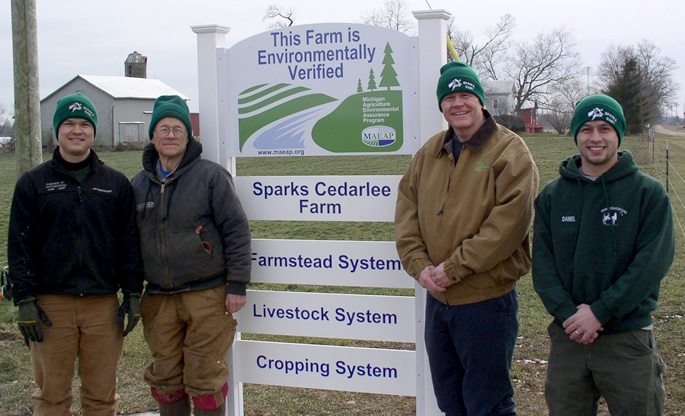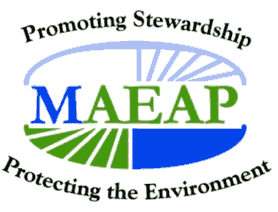Menu
Helping wheat farmers get verified in the voluntary Michigan Agriculture Environmental Assurance Program (MAEAP) was an early goal of the Michigan Wheat Program.
MAEAP is an innovative, proactive partnership between farmers and the Michigan Department of Agriculture and Rural Development (MDARD). MAEAP helps farms of all sizes develop and implement a cost-effective environmental assurance program that assures neighbors and communities that Michigan farmers are engaging in pollution prevention practices and working to comply with state and federal environmental regulations.
Since it became law in 2011, MAEAP has helped reduce farmers’ legal and environmental risks through education, farm-specific risk assessment and best-practices implementation, and by providing on-farm verification of those practices.

MAEAP requirements were developed beginning in 1997, by a coalition of farmers, ag commodity groups, the Michigan Department of Agriculture & Rural Development, Michigan Farm Bureau, conservation districts, conservation groups, and other state and federal agencies. It was the first piece of legislation signed by incoming Gov. Rick Snyder.
About 4,038 MAEAP verifications have occurred on about 2,800 Michigan farms as of June 2017. Farms must be re-verified every five years to maintain their designation.
To help wheat farmers become MAEAP-verified, the Michigan Wheat Program offers a modest financial incentive to each producer who completes the three-phase process. (See “Farmer Perks” for details.) Most producers find the verification process satisfying and say it affirms the extra care they’re already taking of their land.
The first step is for growers to attend a Phase I MAEAP meeting or an on-line virtual meeting. Details and the event schedule may be found at www.maeap.org.

Read how MWP board members earned their MAEAP verification.
Michigan Wheat Program supports MAEAP
MAEAP is a voluntary program that allows growers large and small to identify and prevent environmental risks on their farms.
Read more about MAEAP.
The Michigan Wheat Program is a state-check off program voted in by the state’s wheat farmers to assess each bushel of wheat grown and sold. The funds from the program are utilized to further the wheat industry in the state benefitting the state’s nearly 8,000 wheat farmers who grow about 450,000 acres of wheat annually producing about a 40 million bushel crop.